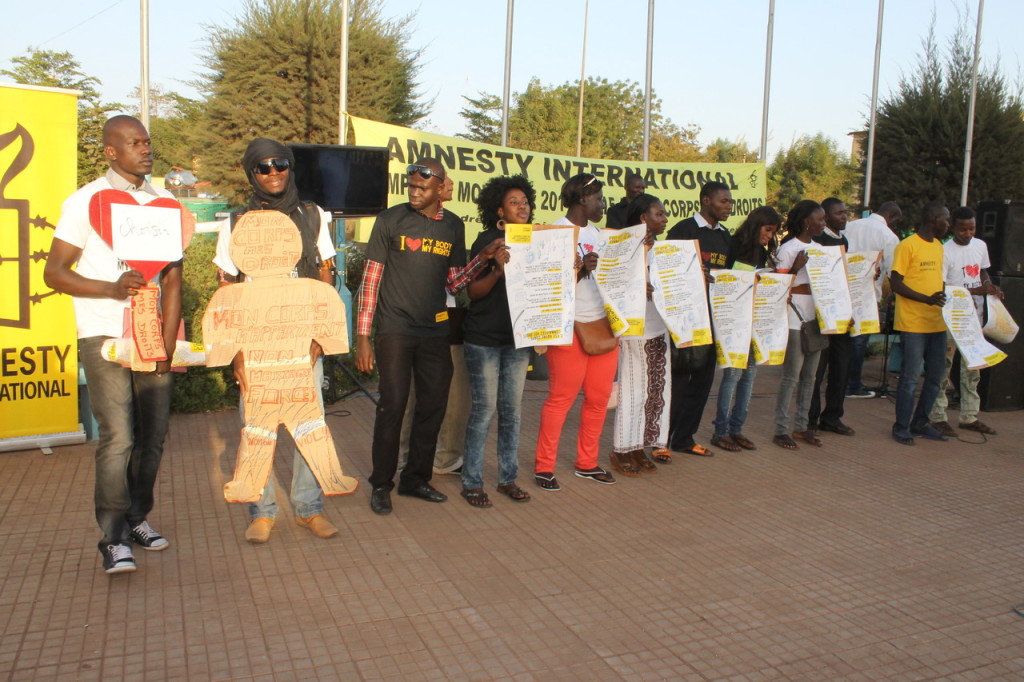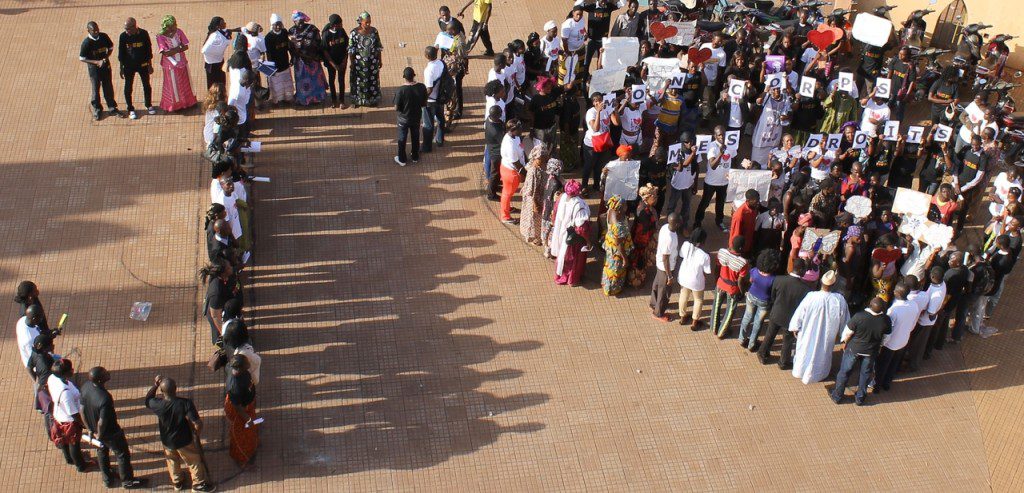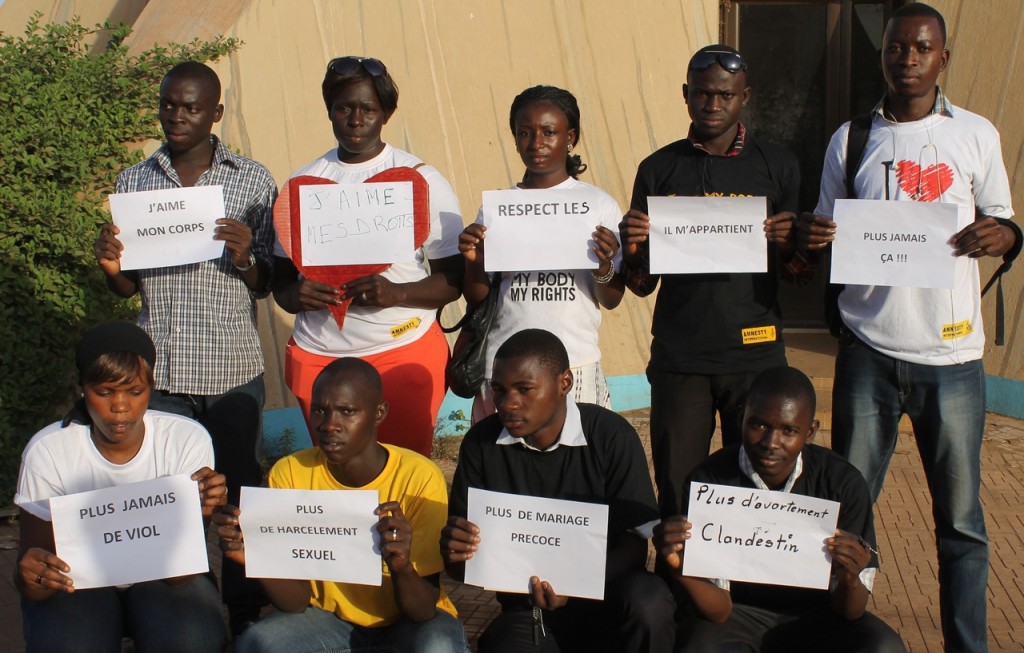Amnesty International Mali tackled the sensitive topic of sexual and reproductive rights by using human rights education to enable young people to create a comfortable space in which to discuss taboo issues with their peers, leading not just to talk, but to music and song.
My Body My Rights’ by young Malian musician, Aly Traoré
The Challenge: starting a dialogue on an ignored topic
For Amnesty International Mali, there was a challenge in holding an event on sexual and reproductive rights, as they found that many of the schools they worked with had largely ignored the topic. Nonetheless, the team was determined to start a dialogue on the issue, and held the ‘Exprimez-Vous’ (Speaking Out) workshop on 5 March, 2014, in Bamako.
Fifteen activists from youth associations across the capital participated in this human rights education activity, launching the My Body My Rights campaign, which was designed for young people to openly discuss sexual and reproductive rights.
‘Be Brave! Be Determined!’
Hamane Toure, the Human Rights Education Coordinator at Amnesty Mali, emphasized the importance of enabling youth to express themselves. ‘Young people are willing to listen, if you give them the space and opportunity to share their views. You have to be brave. You have to be determined. Do not be afraid to speak about sexuality.’
‘I have learned that my body belongs to me, no one has the right to choose for me. I have to take advantage of all my sexual and reproductive rights. I can decide who I want to marry, how many children I want or not. This has made me happy, because before, I did not know that I had these rights.’
Fanta, Youth Leader

Two dynamic youth coordinators led the workshop, and the ensuing discussion centered on sexuality and human rights, as well as the links between rape and abortion, and poverty and development. Facilitators created a safe and comfortable space where young men and women could sit side by side and freely exchange their opinions and personal experiences on the topic, leading to a lively debate.
According to organizers, the influence of ‘traditional perspectives’ was evident at the start of the session. Participants discussed how cultural norms portrayed women as ‘sweet’ and ‘gentle’, while men were ‘tough’ and ‘strong’. But by the end, ideas about gender roles had changed, as the youth came to understand the importance of sexual and reproductive rights.
Fanta, one of the participating youth leaders, said, ‘I have learned that my body belongs to me, no one has the right to choose for me. I have to take advantage of all my sexual and reproductive rights. I can decide who I want to marry, how many children I want or not. This has made me happy, because before, I did not know that I had these rights.’
Hamounata, another young activist, expressed similar thoughts. ‘In Mali, the issue of sexual and reproductive rights is a taboo subject. We thought it was only the man who decides how many children to have and what dreams women can have. I realize now that women also have also the right to choose, women can choose when or if we want to get married.’

I Heart My Body My Rights
Young musician Aly Traoré composed a song for the occasion. Entitled ‘My Body My Rights’, the tune pays homage to brave young women and girls, and urges parents to send their children to school, rather than pressure them into early marriage.
The young activists created eye-catching posters with positive messages of choice and freedom, and the climax of the event took place later in the day when the activists formed a human chain in the shape of a heart at the Tour d’Afrique, a busy intersection. By using their creativity, the young people were able to display the importance of sexual and reproductive rights in innovative, engaging ways.
Mohamed noted, ‘We now have the ability to train others. In turn, we must help those with little knowledge on sexual and reproductive rights.’ More workshops will be held throughout the two-year campaign, in keeping with the overarching goal of preparing young men and women to become peer educators on sexual and reproductive rights.
Amnesty International launched the My Body My Rights campaign in March 2014, which aims to empower individuals to make informed choices about their sexuality and reproduction, and to exercise their sexual and reproductive rights freely.
‘Speaking Out!’ is a youth engagement human rights education activity to help start a conversation and enable young people to take meaningful action for the My Body My Rights campaign and become campaign champions.
The My Body My Rights human rights education activities aim to engage youth to:
Increase their understanding of sexual and reproductive rights, how they affect their lives and why they are important,
Have their voices and opinions highlighted in the global campaign launch,
Begin or continue their involvement with the My Body My Rights campaign and sexual and reproductive rights work with Amnesty International,
Develop skills by facilitating human rights education and activism with other young people.
Subscribe to the Human Rights Education blog series
Header Picture: Youth participating in the ‘Exprimez-Vous’ human rights education activity in Bamako display messages related to the My Body My Rights campaign.©Amnesty International


